Running a dental practice, like any business, is like trying to keep several plates spinning at once. You need to be a mixture of dentist, manager and business owner. We’ve been running our own dental practices for over 20 years and we know the mistakes you need to avoid to make it successful. Let’s dive into ten important areas where things can go wrong and figure out how to handle them .
Hiring Cheap vs Hiring Right
Navigating the world of managing a dental practice can be tricky, especially when it comes to building a skilled and reliable team. While keeping costs low is important, hiring people just because they’re cheap can lead to big problems. Let’s explore why hiring the right way is crucial and how to tackle this aspect of dental practice management.
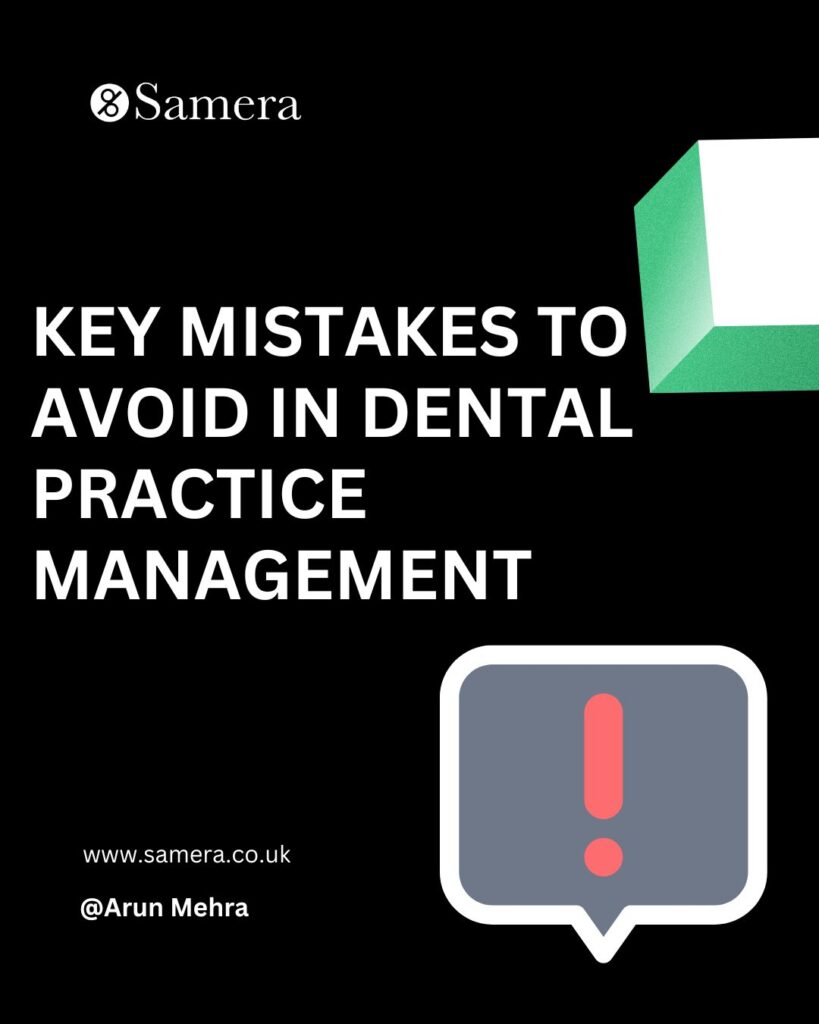
The Pitfalls of Going for Cheap Hires
It might seem like a good idea to hire people who ask for lower salaries to save money. However, this approach can cause serious issues, like a potential drop in the quality of patient care, less teamwork, and overall hindrance to the growth of your practice.
Instead of only thinking about costs, you need to focus on the long-term benefits of investing in skilled individuals. A talented team not only adds to the clinical excellence of your practice but also contributes to its overall success and lasting power.
Strategies for Hiring Right
- Clearly Define Hiring Criteria: Spell out clear criteria for the roles you want to fill. Identify the essential qualifications, skills, and qualities that align with your practice’s values and goals.
- Thorough Hiring Process: Take the time to run a thorough hiring process. This includes creating detailed job descriptions, reviewing resumes, conducting in-depth interviews, and checking references. Quick decisions can lead to hiring mistakes.
- Consider Cultural Fit: While technical skills matter, don’t forget about cultural fit. A team that aligns with your practice’s values creates a positive work environment and enhances patient care.
- Competitive Compensation: Avoid the pitfalls of hiring cheaply by ensuring your compensation packages are competitive in the industry. This not only attracts top talent but also retains valuable team members.
- Invest in Education: Allocate resources for ongoing training and professional development. This not only enhances your team’s skills but also shows your commitment to their growth, fostering loyalty and job satisfaction.
- Use Networking and References: Tap into professional networks and seek references when hiring. Recommendations from trusted colleagues can provide valuable insights into potential candidates’ abilities and work ethic.
Benefits of Hiring Right
- Improved Patient Satisfaction: A team with the right skills leads to a higher standard of patient care, resulting in increased satisfaction and positive feedback. This can be especially true when it comes to front-of-house staff.
- Increased Practice Efficiency: Skilled and experienced staff contribute to the smooth operation of the practice, reducing the likelihood of errors and setbacks.
- Positive Work Environment: A team that works well together and includes qualified members creates a positive work environment, boosting morale and productivity.
- Long-term Practice Growth: Investing in the right team sets the foundation for long-term practice growth and success.
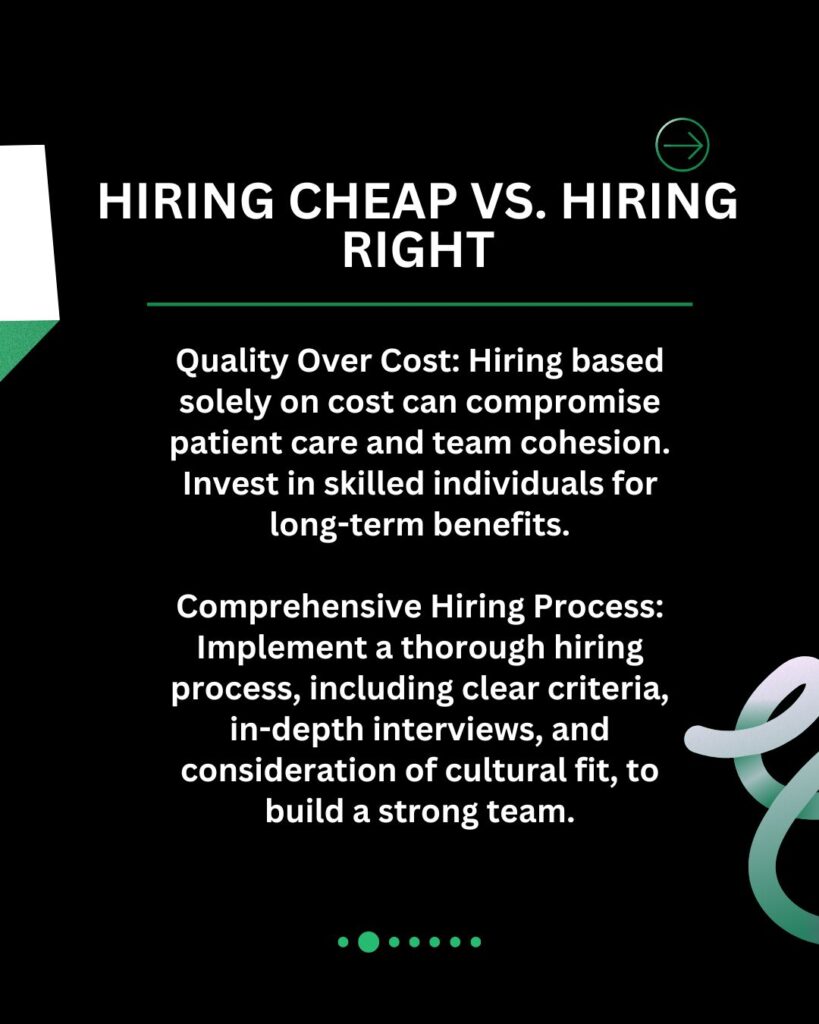
Read our article on Building a Dental Team.
Blindly Trusting Partners and Suppliers
Trust is the foundation of a successful partnership. This is especially true when it comes to your suppliers and contractors like builders, maintenance and architects. However, blindly trusting professionals without careful consideration can lead to unexpected problems.
The Risks of Blindly Trusting
While trust is crucial for good professional relationships, blindly trusting can expose your dental practice to various risks, including poor work quality, budget overruns, and project delays. Putting your practice’s foundation in the hands of the first expert without thorough consideration could have consequences affecting both your financial stability and patient care.
- Conduct Thorough Research: Before committing to any professional service, conduct extensive research on potential architects and builders. Explore their history, reviews, and past projects to assess their competence and reliability.
- Seek Recommendations: Harness the power of recommendations from trusted colleagues, industry associations, and online platforms. Learning about others’ experiences can provide valuable insights into the excellent skills and capabilities of the professionals you are considering.
- Request and Verify References: Ask for references from prospective architects or builders and take the time to verify them. Interviewing past clients can give you a clear picture of their performance, reliability, and adherence to timelines.
- Detailed Contractual Agreements: Develop detailed and comprehensive contractual agreements. Clearly outline project scopes, schedules, financial considerations, and expectations. A well-structured contract minimizes the risk of misunderstandings and disputes down the line.
- Multiple Bids and Quotes: Don’t settle for the first offer that comes your way. Request multiple bids and quotes to ensure you are getting fair pricing and a comprehensive understanding of the services offered.
- Visit Completed Projects: Whenever possible, visit projects completed by the professionals you are considering. This firsthand observation can provide a clear sense of their work quality and attention to detail.
Benefits of Strategic Trust-Building
- Quality Craftsmanship: Building trust through careful selection ensures that you engage professionals committed to delivering high-quality craftsmanship aligned with the standards of your dental practice.
- Timely Project Completion: Professionals with a proven track record are more likely to adhere to project timelines, preventing disruptions to your practice’s daily operations.
- Financial Confidence: Fully screened professionals are less likely to surprise you with unexpected costs, providing financial confidence throughout the project.
- Enhanced Patient Experience: A high-quality project contributes to a positive patient experience. Minimizing disruptions and maintaining a professional environment can positively impact patient perceptions.
Find out more about our Dental Buying Group to make sure you get the right suppliers and partners.
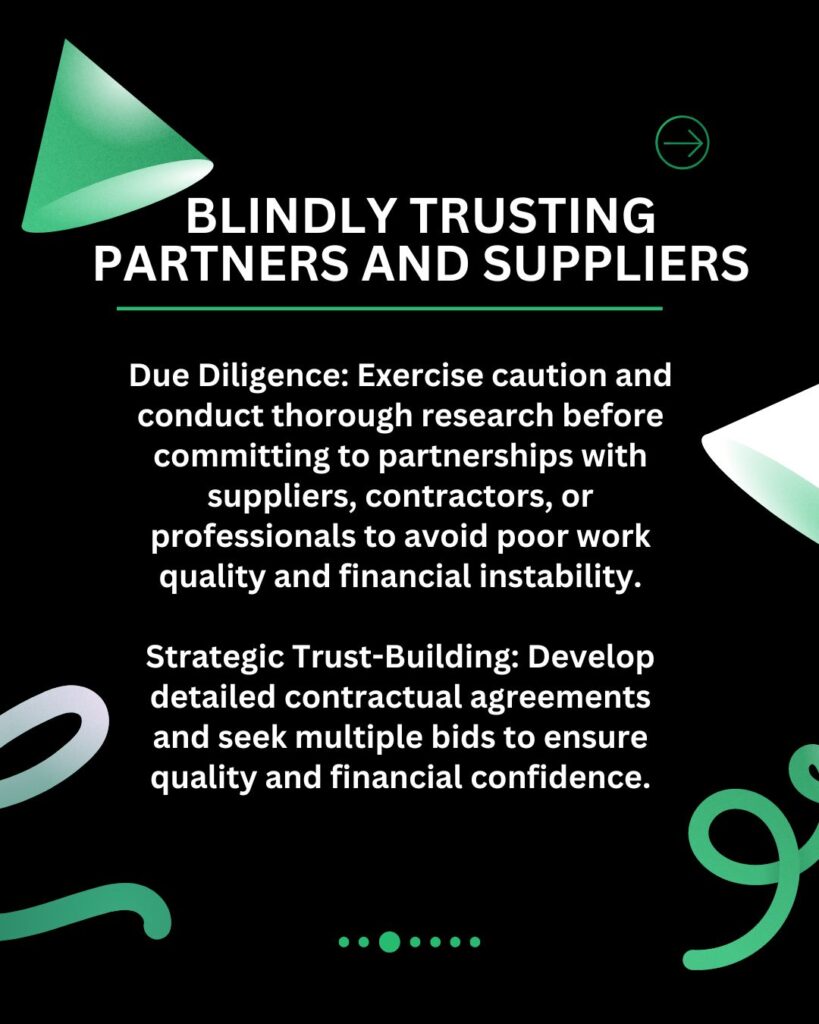
Did You Know?
- Patient Retention vs. Acquisition Costs: It is more cost-effective to retain an existing patient than to acquire a new one, with retention being up to five times less expensive than acquisition. This emphasizes the need for effective patient retention strategies that engage current patients while maintaining high standards of dental care.
Source: Yapi - Impact of Online Reviews: The average dental practice retains only 41% of new patients, and positive personal recommendations are the top reason patients choose one practice over another. This highlights the importance of word-of-mouth referrals and managing online reviews to enhance the practice’s reputation and patient retention.
Source: Doctor Logic - Dental Billing Errors and Costs: Patient acquisition can cost up to 25 times more than patient retention. Additionally, research shows that the average attrition rate in dentistry is 17%, indicating that focusing on patient retention can significantly impact a practice’s bottom line and efficiency.
Source: Oral Health Group
Personality vs. Package
It’s crucial to build a team that not only has the right clinical skills but also works well together. Relying solely on personal qualities when hiring associates, nurses and front-of-house staff can lead to problems, even though a positive personality can improve the workplace. It’s essential you consider the whole package — skills, qualifications, and compatibility with the team — when making hiring decisions for a well-rounded and successful dental practice.
The Pitfalls of Personality-Driven Hiring
While having a positive and friendly personality is an asset, depending only on this quality during the hiring process may overlook essential factors for a successful dental practice. Hiring associates based mainly on personal qualities could result in a mismatch of skills, inadequate qualifications, and potential disruptions to the team’s collaboration.
Balancing Personality and Proficiency
- Define Comprehensive Hiring Standards: Establish clear hiring standards that include the candidate’s personality, skills, qualifications, and compatibility with the team. Clearly outline the essential traits needed for success in the specific role.
- Structured Screening: Plan a structured screening that evaluates both technical capabilities and interpersonal skills. Include scenario-based questions to assess how well the candidate can handle real-world problems in a dental practice setting.
- Assessment of Skills and Qualifications: Give priority to evaluating a candidate’s qualifications and skills. Assess their education, training, and experience to ensure they have the necessary expertise to contribute positively to the clinical aspects of the practice.
- Team Compatibility Assessment: Consider how well a candidate fits into the existing team dynamics. Evaluate their ability to collaborate, communicate, and contribute positively to the workplace. Team compatibility is crucial for maintaining a strong and pleasant practice culture.
- Reference Checks: Verify the candidate’s past performance, work ethic, and collaborative ability through thorough reference checks. Insights from past colleagues or supervisors can provide valuable perspectives on the candidate’s overall package.
Benefits of Holistic Hiring
- Enhanced Clinical Capability: Prioritizing skills and qualifications ensures that your team has the clinical expertise necessary to deliver top-notch patient care.
- Efficient Team Dynamics: Considering team compatibility contributes to the creation of a workplace where team members collaborate seamlessly, improving overall practice efficiency.
- Reduced Attrition: A comprehensive approach to hiring reduces the likelihood of mismatches between the candidate and the practice, ultimately lowering turnover rates and promoting team loyalty.
- Positive Patient Connections: A well-rounded team, combining technical expertise and positive interpersonal skills, contributes to a positive patient experience, fostering patient loyalty and satisfaction.
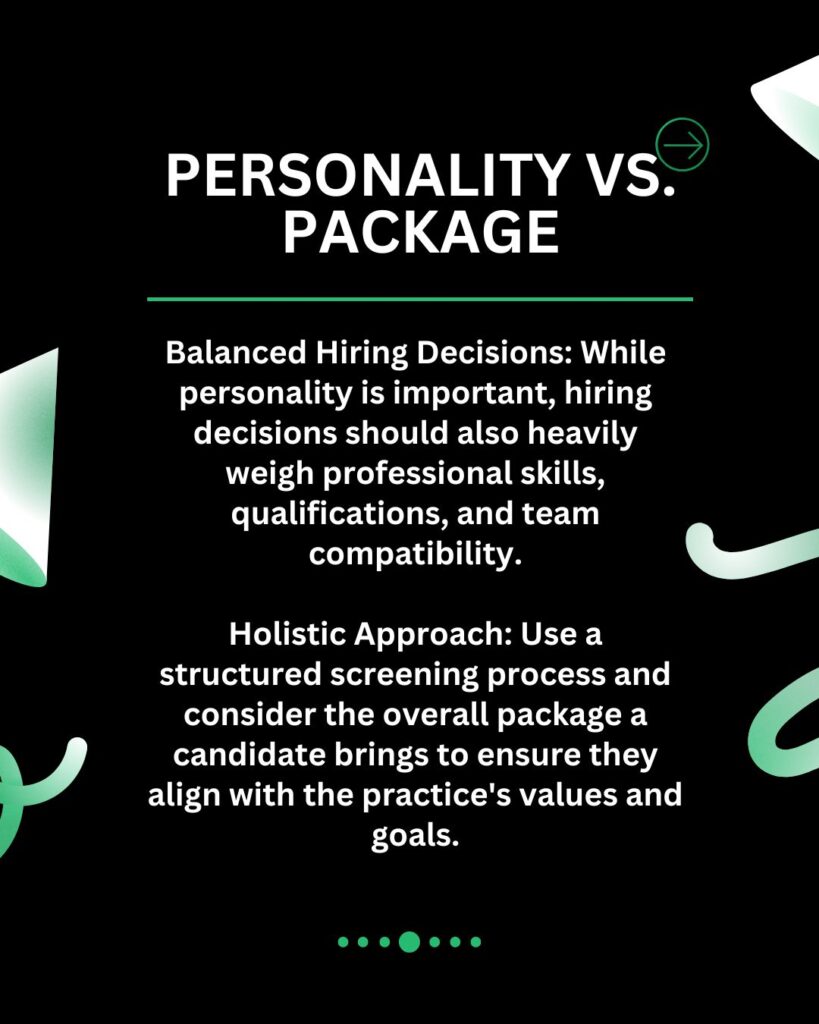
Associates and Employment Tribunals
It’s crucial to understand and follow the details of employment classifications to avoid legal troubles. Failing to distinguish between associates and employees can lead to potential problems, especially ones that could end up in court. Let’s explore the importance of recognizing each team member’s specific status and following employment rules to ensure a legally sound and friendly dental practice environment.
The Complications of Getting it Wrong
Associates and employees have different legal positions with responsibilities, and not recognizing these differences can lead to serious consequences. Misclassifying team members can result in disputes about qualifications, benefits, and potential legal actions that might end up in court.
- Understand Legal Distinctions: Learn about the legal differences between associates and employees. While employees have specific rights, entitlements, and legal protections, associates often work as independent contractors.
- Review Employment Agreements: Clearly define the terms of engagement in employment contracts. Specify the nature of the relationship, whether it’s that of an associate or an employee, along with specific rights, responsibilities, and benefits.
- Consult Legal Experts: Seek guidance from legal experts specializing in employment law or dental practice management. A legal expert can help you navigate the complexities of employment classifications, ensuring compliance with regulations.
- Update Contracts Regularly: Keep employment contracts up to date to reflect any changes in the working relationship. This is crucial to adapt to evolving legal requirements and prevent potential mistakes.
- Communicate Clearly: Be open and honest with team members about their employment status. Explain expectations, responsibilities, and any anticipated changes in their status to avoid confusion or dissatisfaction.
Benefits of Legal Compliance
- Prevention of Legal Disputes: Recognizing and adhering to legal distinctions prevents disputes about qualifications, benefits, and working conditions, reducing the likelihood of legal actions and court battles.
- Employee Satisfaction: Clear communication and adherence to employment rules contribute to employee satisfaction, fostering a positive workplace and reducing turnover rates.
- Upholding Practice Reputation: A legally compliant dental practice builds a positive reputation, both within the community and among patients. This can positively impact the practice’s standing locally.
- Economic Stability: Avoiding legal disputes and court battles contributes to economic stability by preventing unexpected legal expenses and potential compensation payouts.
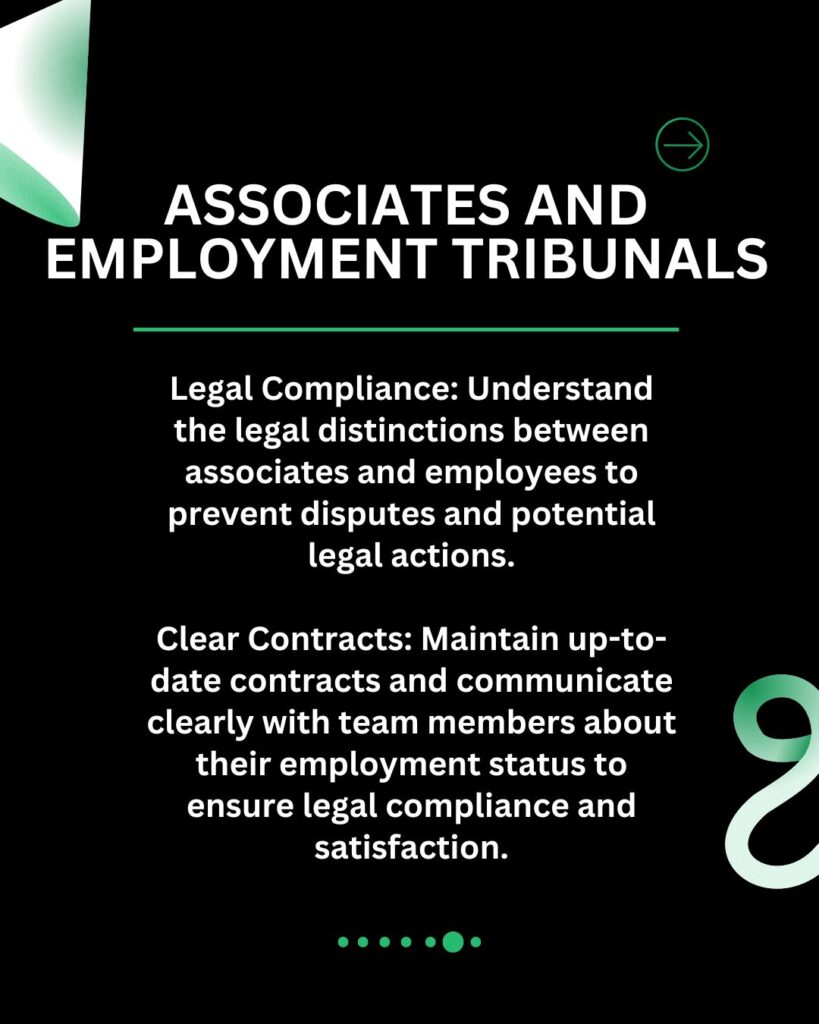
Read our article on Leadership Tips for Dentists.
Diversify Workload Distribution
How tasks are assigned among team members plays a crucial role in maintaining efficiency and preventing burnout. Making the mistake of concentrating all tasks in one place—unevenly assigning responsibilities—can lead to a host of problems affecting both your team’s well-being and the overall effectiveness of the practice. Let’s look at the importance of optimizing task distribution to create a fair and productive workplace.
The Pitfalls of Uneven Tasks
Unevenly assigning tasks, whether unintentionally or due to certain team members carrying most of the load, can result in setbacks, lowered morale, and increased burnout. It may lead to reduced job satisfaction, hindering the overall effectiveness of your dental practice.
Strategies for Task Optimization
- Assess Individual Strengths: Understand the strengths and skills of each team member. Evaluate their abilities, experience, and preferences to align tasks with their resources, promoting efficiency and job satisfaction.
- Regularly Review Tasks: Periodically review the task distribution among team members. Ensure that no one is consistently overloaded while others have lighter workloads. Regular assessments allow for adjustments as needed.
- Encourage Open Communication: Create an open and communicative environment where team members feel comfortable discussing their tasks. Encouraging feedback ensures a collaborative approach to managing workloads, addressing concerns proactively.
- Cross-Training Opportunities: Provide cross-training opportunities to team members to expand their skill sets. This not only prevents your team from relying too heavily on a few individuals but also makes them more adaptable.
- Implement Efficient Scheduling: Promote efficient scheduling practices that evenly distribute patient appointments and tasks throughout the week. Avoid creating peaks and valleys in workload that can lead to stress and setbacks.
Benefits of Task Optimization
- Increased Efficiency: Distributing workloads diversely contributes to overall practice efficiency by preventing bottlenecks and ensuring a steady flow of tasks.
- Prevention of Burnout: Evenly dispersing tasks prevents burnout by avoiding the fatigue and stress associated with consistently heavy workloads.
- Improved Job Satisfaction: Team members who feel that their tasks are fair and balanced are likely to experience higher job satisfaction, fostering a positive work culture.
- Optimized Use of Resources: Utilizing the unique strengths of each team member enhances resource utilization, leading to a more efficient and effective dental practice.
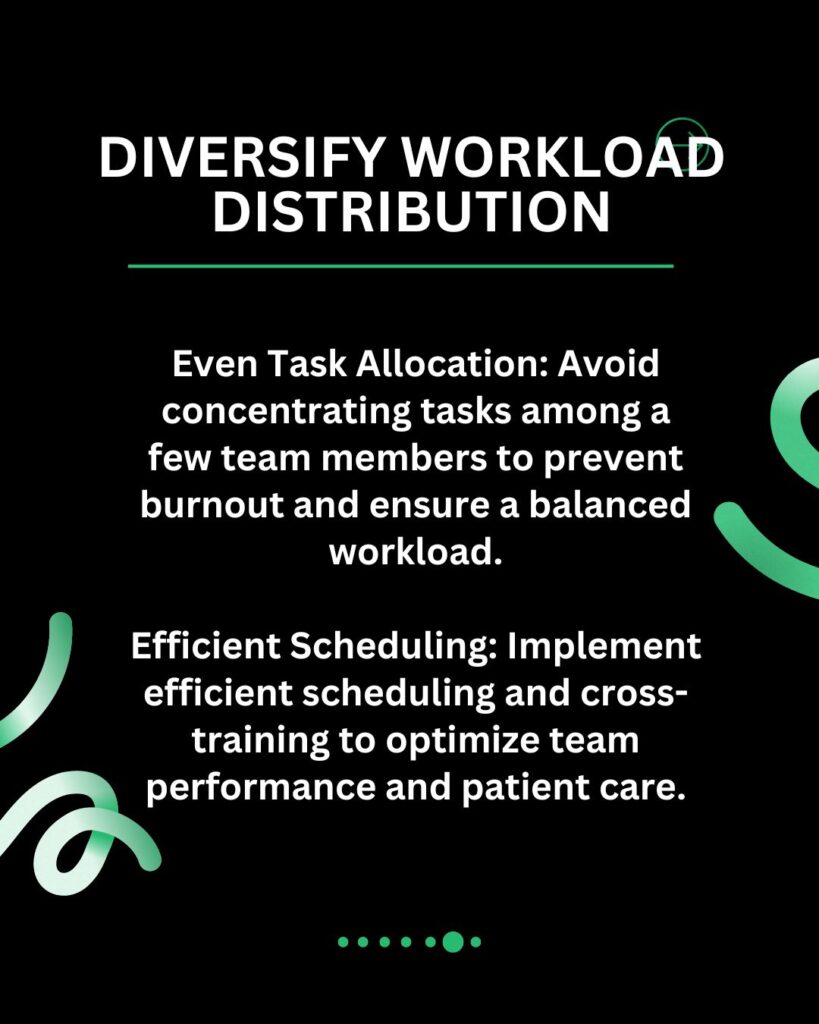
Rushed Recruitment Practices
Hiring new team members is a critical step that can significantly impact the success and unity of the team. Rushed recruitment, driven by the urgency to quickly fill positions, can lead to hiring individuals who may not align with the values and goals of the practice.
The Pitfalls of Rushed Hiring
When the recruitment process is hurried, there’s a risk of hiring individuals who lack the necessary skills, cultural fit, or long-term commitment to effectively contribute to the success of the dental practice. This rushed approach can result in increased turnover, decreased camaraderie, and potential disruptions to patient care.
Strategies for Comprehensive Recruitment
- Clearly Define Hiring Needs: Clearly articulate the specific requirements and qualifications for the position before starting the recruitment process. Outline the skills, qualifications, and attributes essential for success in the role.
- Develop Detailed Job Descriptions: Create detailed job descriptions that outline the responsibilities of the position and provide insights into the practice’s culture, values, and expectations. This attracts candidates who resonate with the overall ethos of the practice.
- Implement an Organized Screening: Establish a well-organized interview process that assesses the candidate’s compatibility with the values of the practice as well as their technical skills. Use behavioural and situational questions to gain insights into their independent direction and problem-solving abilities.
- Use Multiple Assessment Tools: Go beyond traditional interviews by incorporating other assessment tools like skills assessments, situational judgment tests, and personality evaluations. This multi-layered approach provides a more comprehensive understanding of the candidate’s suitability.
- Thoroughly Examine References: Conduct thorough reference checks with former employers or coworkers to learn more about the candidate’s work ethic, interpersonal skills, and overall performance in previous roles.
- Be Patient and Specific: Resist the temptation to rush the recruitment process. Be patient and specific, waiting for candidates who not only meet the technical requirements but also align with the culture and values of the dental practice.
The Benefits of Thorough Hiring
- Enhanced Team Cohesion: Thorough recruitment ensures that new team members align with the existing team’s values and work closely towards shared goals, fostering a positive workplace.
- Reduced Attrition: Carefully selecting candidates who are a good fit for the practice can save time and resources associated with frequent recruitment.
- Increased Job Satisfaction: Team members who align with the practice’s values are likely to experience higher job satisfaction, contributing to overall morale and productivity.
- Consistent Patient Experience: Patients’ confidence in the dental team is strengthened when they are hired by individuals who share the practice’s core values.
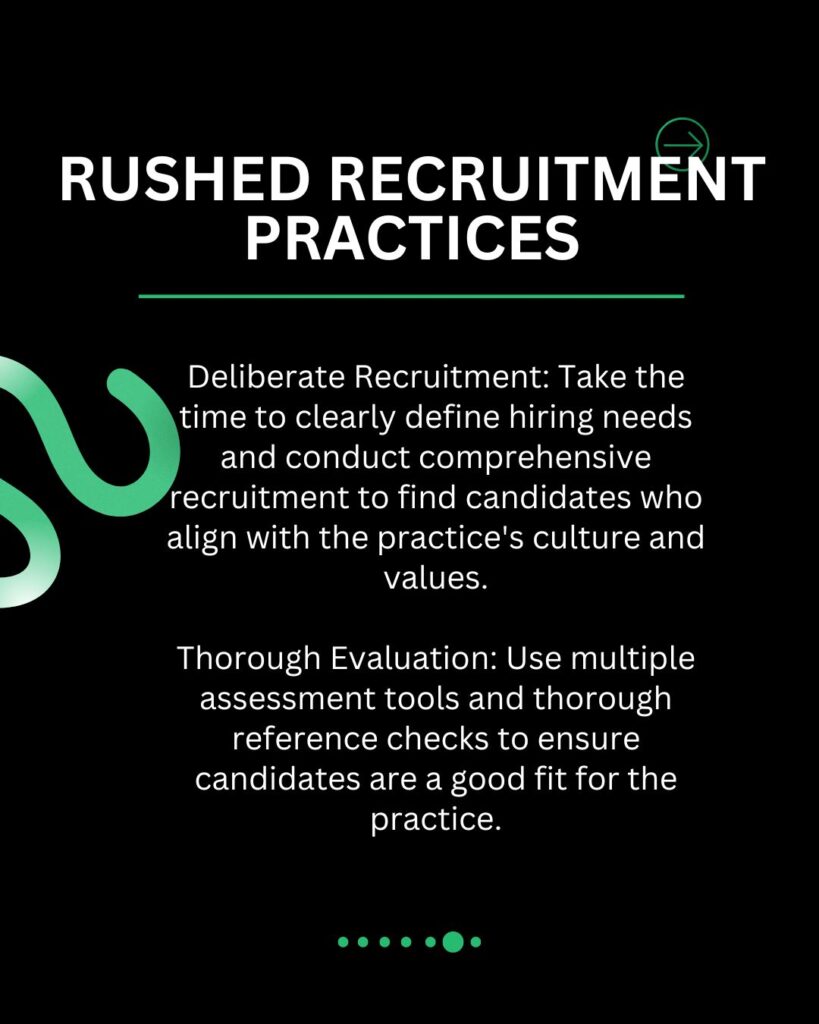
Avoid Team Dependency
The success of a practice is closely tied to the strength and diversity of its team. Relying too much on a few key team members can pose significant risks to the practice’s stability and adaptability. Avoiding team dependence and instead building a well-rounded team with diverse skills and qualities ensures flexibility in the face of unexpected challenges.
The Pitfalls of Depending Too Much on a Few
Heavily depending on a few key team members, while seeming efficient in the short term, can lead to vulnerabilities when these individuals are unavailable or encounter unexpected challenges. Team dependence poses risks to continuity, efficiency, and the overall adaptability of the practice.
Strategies to Avoid Team Dependence
- Identify Key Skills and Roles: Clearly identify the essential skills and roles necessary for the smooth operation of the practice. Ensure that no single team member possesses exclusive knowledge or skills critical to essential functions.
- Cross-Train Team Members: Implement cross-training programs to enhance the skill set of team members. This ensures that multiple individuals are proficient in key areas, reducing reliance on specific individuals.
- Encourage Knowledge Sharing: Cultivate a culture of knowledge sharing within the team. Encourage team members to share their expertise, insights, and best practices, promoting a collaborative environment.
- Establish Clear Protocols and Procedures: Develop clear protocols and procedures for key tasks and responsibilities. This documentation ensures that tasks can be seamlessly assigned or taken over by other team members in case of absence or unforeseen circumstances.
- Regular Team Meetings: Conduct regular team meetings to discuss ongoing projects, challenges, and opportunities. This improves communication and ensures that all team members are aware of current initiatives and responsibilities.
- Foster Leadership Development: Promote the development of leadership skills among team members. Cultivate a team culture where individuals are empowered to take on leadership roles when needed, distributing decision-making responsibilities.
Benefits of Avoiding Team Dependence
- Continuity of Operations: Even when certain team members are unavailable, practice operations can continue to run smoothly due to the diversification of skills and responsibilities.
- Enhanced Adaptability: A well-rounded team with diverse skills is more adaptable to changes, challenges, and unexpected events that may impact day-to-day operations.
- Reduced Vulnerability: By avoiding team dependence, the practice becomes less vulnerable to disruptions caused by vacations, sick leaves, or unexpected departures of key team members.
- Improved Team Morale: An equitable distribution of responsibilities and acknowledgment of each team member’s contribution enhances team morale and fosters a positive workplace.
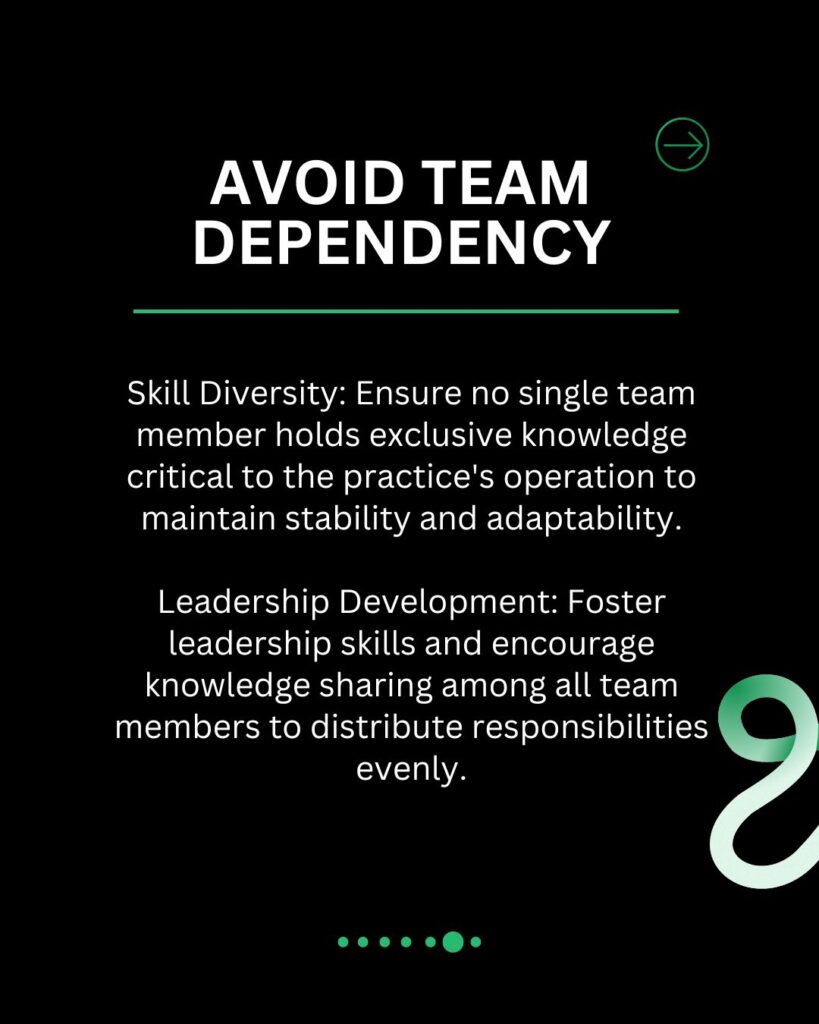
Not Keeping an Eye on the Finances
Keeping an eye on finances is crucial for long-term success and sustainability. Ignoring careful financial management, especially in the early stages of the practice, can strain resources and hinder the achievement of practice goals. Being mindful of spending, creating realistic budgets, and avoiding unnecessary expenses helps to ensure financial security.
The Pitfalls of Ignoring Financial Prudence
Overlooking the financials can lead to overspending, budget overruns, and financial strain, especially in the developmental stages of a dental practice. This oversight may compromise the practice’s ability to grow strategically, invest in essential resources, and withstand unforeseen financial challenges.
Financial Prudence Strategies
- Create a Realistic Budget: Develop a comprehensive and realistic budget that covers all aspects of your dental practice, including equipment, staffing, marketing, and other expenses. Ensure that your budget aligns with your practice’s short-term and long-term goals.
- Regularly Monitor Financial Performance: Establish regular financial analysis and monitoring. Track income, expenses, and key performance indicators to identify trends and areas where adjustments may be necessary.
- Prioritize Essential Expenditures: Prioritize essential expenditures that directly contribute to the quality of patient care and the efficiency of practice operations. Invest wisely in equipment, technology, and training that enhance the overall patient experience.
- Avoid Impulse Buys: Resist the temptation of impulse purchases. Evaluate the necessity and long-term value of any investment before committing financial resources, ensuring that each expense aligns with your practice’s objectives.
- Negotiate Vendor Agreements: Negotiate vendor agreements to secure favourable terms and pricing for essential supplies and services. Regularly review contracts to identify potential cost-saving opportunities.
- Prepare for Emergencies: Include a contingency fund in your budget for emergencies or unforeseen costs. Planning for contingencies provides a financial safety net and mitigates the impact of unexpected challenges.
Benefits of Financial Prudence
- Positioning for Financial Stability: Implementing financial prudence ensures a stable and secure financial position for your dental practice, allowing for strategic planning and growth.
- Sustainable Growth: Careful financial management supports sustainable growth, enabling your practice to invest in essential resources and seize critical opportunities as they arise.
- Reduced Financial Stress: By avoiding unnecessary expenses and adhering to a well-planned budget, you reduce financial stress and create a more resilient practice.
- Boost in Profitability: Minimizing unnecessary expenditures and optimizing resource allocation efficiency, financial prudence contributes to improved profitability.
Check out our articles and webinars on finance for dentists.
Not Seeking Professional Advice
Getting expert advice is essential to run your practice. If a practice doesn’t realize how crucial it is to seek guidance, especially in legal and financial matters, it might end up facing problems that could have been avoided. A great dentist isn’t necessarily a great business owner, so it’s crucial you get the advice of those who are.
The Pitfall of Underestimating Professional Guidance
Underestimating the need for professional advice in legal and financial matters might lead to non-compliance with rules, legal disputes, financial mismanagement, and missed opportunities for strategic growth. Ignoring expert guidance can disrupt the overall success and sustainability of a dental practice.
Approaches for Seeking Professional Counsel
- Establish an Expert Network: Identify and connect with professionals specializing in dental practice management, including legal advisors, accountants, and financial experts. Build a network of experts who understand the specific challenges and regulations of the dental industry.
- Regular Consultations: Schedule regular consultations with legal and financial experts to review the operational and financial aspects of your practice. This proactive approach allows you to address issues before they escalate.
- Compliance Audits: Conduct compliance audits with the assistance of legal experts to ensure that your practice adheres to industry standards, ethical norms, and legal requirements. Identify and rectify any potential compliance gaps.
- Financial Planning and Strategy: Collaborate with financial advisors to develop a comprehensive financial plan and strategy for your dental practice. This includes budgeting, tax planning, investment strategies, and long-term financial goals.
- Stay Informed on Industry Changes: Legal and financial landscapes evolve, and staying informed is crucial. Rely on the expertise of professionals to keep you updated on industry changes, new regulations, and best practices that may impact your practice.
- Address Legal Issues Promptly: Utilize the advice of legal professionals to address legal issues as soon as they arise. Delaying or mishandling legal issues can lead to more significant challenges and financial implications.
Benefits of Seeking Professional Advice
- Risk Mitigation: Professional advice identifies and mitigates potential risks, ensuring that your dental practice operates within legal and regulatory boundaries.
- Financial Stability: Financial experts contribute to the stability of your practice by providing sound financial advice, helping you make informed decisions aligned with your business goals.
- Legal Compliance: Legal professionals ensure that your practice complies with industry standards, preventing legal issues and safeguarding your reputation.
- Strategic Insights: With the assistance of expert guidance, you can overcome obstacles and capitalize on favourable market conditions, opening doors to strategic growth opportunities.
Book a free consultation with us to find out how we and our partners can help.
Not Embracing Technology and Marketing:
Using technology and adopting effective marketing strategies are crucial for staying competitive and enhancing online visibility. Neglecting technological advancements and marketing efforts can result in missed opportunities for practice growth and patient engagement. This section explores the importance of embracing technology, regularly updating your website, and considering early implementation of Pay-Per-Click (PPC) advertising to propel your dental practice into the digital age.
The Risks of Ignoring Technology
A dental practice may stagnate if it doesn’t embrace technology and leverage the potential of digital marketing. In today’s digital era, patients often seek information online, and a lack of technological integration can lead to reduced visibility, patient engagement, and competitiveness.
Strategies for Marketing and Technology Integration
- Regular Website Updates: Ensure your practice’s website is regularly updated to reflect current information, services, and any advancements in technology or treatments. An informative and user-friendly website is crucial for attracting and retaining patients.
- Implement Pay-Per-Click (PPC) Advertising: Consider the early adoption of PPC advertising to boost your practice’s online visibility. Well-executed PPC campaigns can increase website traffic, attract new patients, and provide measurable results.
- Adopt Electronic Health Records (EHR): Embrace Electronic Health Records (EHR) systems for efficient patient management, streamlined workflows, and enhanced communication within your practice. EHR systems contribute to improved patient care and operational efficiency.
- Leverage Telehealth Solutions: Explore telehealth solutions to offer virtual consultations, follow-ups, and patient education. Telehealth can be a valuable addition to your practice’s service offerings, making it easier for patients to access healthcare remotely.
- Utilize Social Media Marketing: Social media platforms provide a robust channel for patient communication and community building. Social media marketing is an effective way to connect with your audience, share valuable content, and showcase your practice’s expertise.
- Implement Online Appointment Scheduling: Online appointment scheduling can simplify the scheduling process for your practice and make it more convenient for patients. This technology can enhance patient satisfaction and practice efficiency.
Benefits of Embracing Innovation and Marketing
- Enhanced Online Visibility: Regular website updates and digital marketing efforts contribute to improved online visibility, attracting potential patients and retaining existing ones.
- Competitive Advantage: Embracing technology gives your practice a competitive edge by staying up to date with industry trends, demonstrating innovation, and meeting the expectations of tech-savvy patients.
- Improved Patient Engagement: Technological advancements, such as telehealth and online scheduling, increase patient engagement by providing accessible and user-friendly healthcare options.
- Measurable Marketing ROI: PPC advertising offers measurable return on investment, allowing you to track the success of your marketing campaigns and make data-driven decisions.
In conclusion, successfully managing a dental practice requires a strategic and holistic approach. By avoiding these common mistakes and adopting best practices, you can cultivate a thriving and resilient dental practice that provides excellent patient care and stands the test of time.
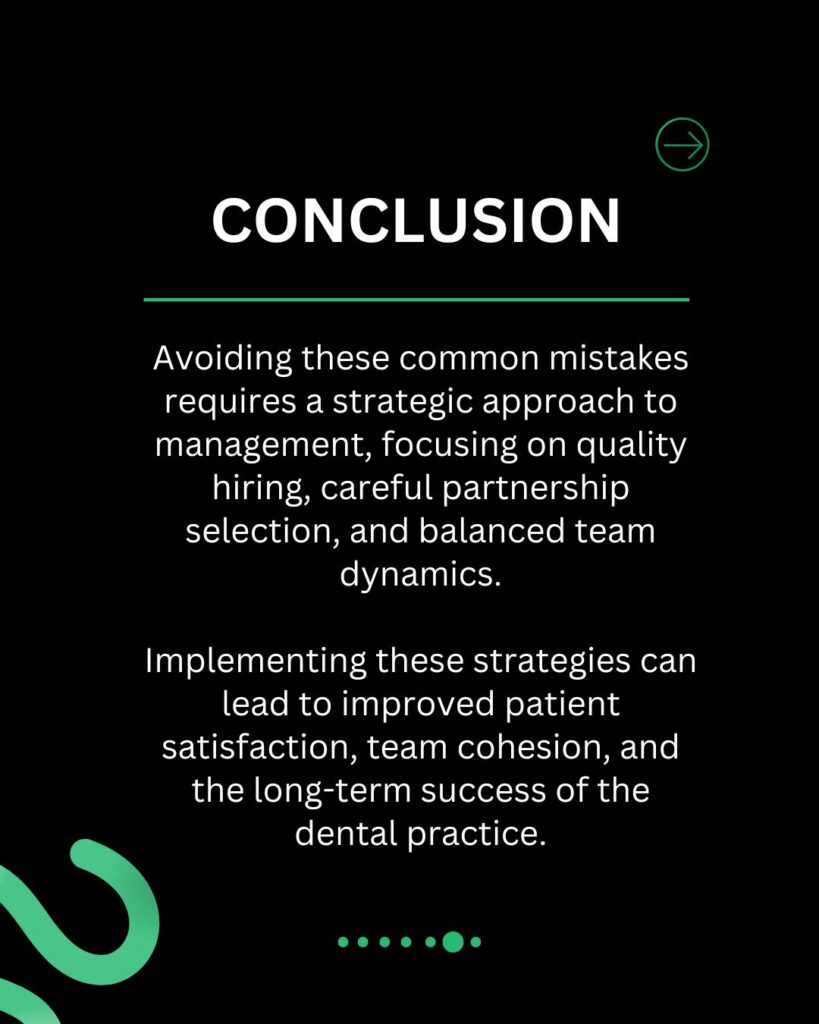
Check out our articles and webinars on digital marketing for dentists.
Mistakes to Avoid When Running a Dental Practice FAQ
What are the top mistakes dentists make when running a practice?
Dentists often make key mistakes when running a practice, such as poor financial management, neglecting patient feedback, and overlooking marketing. Other common errors include under-investing in technology, over-relying on key staff, and failing to track key performance indicators (KPIs). Additionally, poor hiring decisions, ignoring competition, and lack of a clear business plan can hinder growth. Emphasizing continuous education, improving operational efficiency, and building strong supplier relationships are crucial for long-term success.
How can poor financial management affect a dental practice?
Poor financial management can severely affect a dental practice by leading to cash flow issues, inability to cover operational costs, and difficulties in making necessary investments in technology, staff, or marketing. It can also cause problems with loan repayment, tax compliance, and long-term business growth. Failure to manage finances effectively may result in reduced profitability, forcing the practice to cut corners, which could negatively impact patient care and overall service quality.
Why is neglecting marketing a mistake for dental practices?
Neglecting marketing is a critical mistake for dental practices because it limits visibility and growth. Without effective marketing, practices miss opportunities to attract new patients, engage with current ones, and differentiate themselves from competitors. Additionally, in today’s digital age, an absence of online presence and strategic outreach can cause practices to fall behind, reducing patient trust and referrals. Successful marketing helps maintain a steady patient flow, boosts revenue, and strengthens the brand.
What role does technology play in dental practice success?
Technology plays a crucial role in dental practice success by improving patient care, streamlining operations, and enhancing marketing efforts. Digital tools such as practice management software, online appointment systems, and advanced diagnostic equipment help practices run more efficiently. Additionally, using social media, online reviews, and SEO can boost patient engagement and attract new clients. Embracing the latest dental technologies also keeps practices competitive, ensuring better treatment outcomes and patient satisfaction.
How can over-reliance on staff harm a dental practice?
Over-reliance on key staff members can harm a dental practice by creating vulnerabilities if those individuals leave or are unavailable. It can lead to operational disruptions, decreased productivity, and a loss of institutional knowledge. This dependence may also cause stress among the remaining team and hinder growth if tasks and responsibilities aren’t properly delegated or shared. Cross-training and building a resilient team are essential to ensure the practice runs smoothly at all times.
What hiring mistakes should dental practices avoid?
Dental practices should avoid several hiring mistakes, such as not thoroughly vetting candidates, hiring based solely on technical skills without considering cultural fit, and rushing the hiring process. Additionally, failing to provide clear job descriptions and neglecting proper onboarding can lead to staff dissatisfaction and high turnover. Practices should also avoid underestimating the importance of personality, as a positive patient experience often hinges on staff communication and professionalism.
How does failing to track KPIs impact a dental practice?
Failing to track Key Performance Indicators (KPIs) can negatively impact a dental practice by leaving the business blind to its financial health, patient satisfaction, and operational efficiency. Without clear data on revenue, patient retention, treatment acceptance rates, and overhead costs, practices may struggle to identify areas for improvement, set strategic goals, or make informed decisions. Regularly monitoring KPIs helps ensure long-term growth and stability.
Why is ignoring patient feedback a mistake?
Ignoring patient feedback is a mistake because it prevents a dental practice from understanding patient needs, improving services, and addressing concerns. Patient feedback offers valuable insights into areas such as wait times, staff interactions, and treatment satisfaction. Without this input, a practice may lose patients to competitors who are more responsive to their concerns. Regularly gathering and acting on feedback helps enhance patient experience, build loyalty, and improve overall service quality.
How can improper supplier relationships hurt dental practices?
Improper supplier relationships can hurt dental practices by leading to inflated costs, unreliable product deliveries, or subpar quality supplies. Without strong, trustworthy partnerships, a practice may face frequent disruptions in operations, increased expenses, or even legal issues if products don’t meet regulatory standards. Additionally, lacking transparency in these relationships can lead to poor decision-making when it comes to purchasing, ultimately affecting the practice’s bottom line and service quality.
What are the risks of not having a business plan for a dental practice?
Not having a business plan for a dental practice can lead to unclear goals, poor financial management, and inefficient operations. It increases the risk of overspending, underestimating competition, and missing growth opportunities. Without a clear plan, practices may struggle with cash flow, staffing, and patient retention. A solid business plan provides direction, sets measurable objectives, and helps in making informed decisions for long-term success.
Why is continuing education important for dental practice owners?
Continuing education is important for dental practice owners to stay updated with the latest advancements in dental technology, treatment techniques, and regulatory changes. It helps improve patient care, enhances business practices, and ensures the practice remains competitive in an evolving industry. Additionally, continuous learning can boost professional development and staff training, ultimately leading to better patient outcomes and practice growth.
What marketing strategies should dental practices prioritize?
Dental practices should prioritize digital marketing strategies such as search engine optimization (SEO) to improve online visibility, social media marketing to engage with current and potential patients, and email campaigns to retain patient loyalty. Investing in a user-friendly website with online booking capabilities is also crucial. Additionally, gathering and promoting patient reviews helps build credibility and attract new clients. Paid ads on platforms like Google and Facebook can further drive targeted traffic.
How does patient retention affect the growth of a dental practice?
Patient retention is crucial for the growth of a dental practice as it ensures a stable revenue stream, reduces the costs associated with acquiring new patients, and increases word-of-mouth referrals. Loyal patients are more likely to schedule regular treatments, accept high-value services, and refer others, contributing to consistent growth. A high retention rate also reflects patient satisfaction and trust, which are key drivers for long-term success in the competitive dental industry.
What are the consequences of underestimating competition in dentistry?
Underestimating competition in dentistry can lead to a loss of patients, reduced revenue, and stagnant growth. Competitors who invest more in marketing, technology, and patient care can attract your patients, especially if they offer superior services or pricing. Ignoring competition can also result in missed opportunities to improve your practice, refine your services, and stay current with industry trends. Staying aware of competitors helps maintain a competitive edge and ensures long-term success.
How can dental practices improve their operational efficiency?
Dental practices can improve operational efficiency by streamlining administrative tasks through practice management software, automating appointment scheduling, and utilizing digital patient records. Efficient delegation of tasks, cross-training staff, and regularly analyzing key performance indicators (KPIs) can further optimize workflow. Embracing technology like digital imaging and online billing systems enhances both patient experience and internal processes. Effective communication, regular staff training, and ongoing evaluation of procedures also contribute to smoother operations.
Learn more: Related Articles
About the Author

Neha Jain
Neha Jain is a skilled content writer with a rich background in business and financial knowledge. With a bachelor’s degree in English Literature and Psychology, Neha has honed her writing skills, furthering her expertise with the Content Writing Master Course (CWMC) at IIM SKILLS and a Content Marketing Certification from HubSpot Academy.
Working alongside our business development experts, Neha specialises in helping accountants, dentists and other healthcare professionals start, scale and sell their businesses.
Reviewed By:
Grow Your Dental Practice with Samera
Join the Samera Alliance buying group today for free to save money on your consumables and assets, increase your profits and grow your dental practice.
You’ll get access to exclusive discounts on the consumables, products and equipment you need to build and grow your dental practice. You’ll also get exclusive discounts from our Alliance Partners, covering everything from HR, IT and legal services to utilities, compliance and dental technology.
Join for free. Save money. Grow your dental practice.
More on Growing a Dental Practice
For more information on growing a dental practice, check out the articles and webinars in our Learning Centre, like our guide on How to Grow a Dental Practice.
Make sure you never miss any of our articles, webinars, videos or events by following us on Facebook, LinkedIn, YouTube and Instagram.

